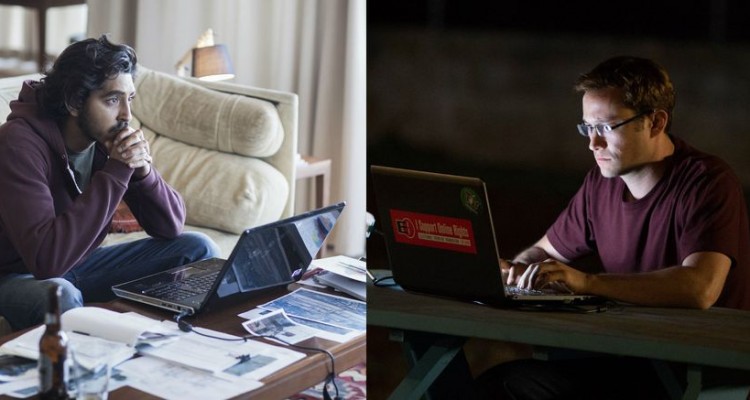Dev Patel plays a man searching for his long-lost home on Google Earth in “Lion” (left), while Joseph Gordon-Levitt plays Edward Snowden in “Snowden” (right).
Commentary: Two of this year’s most powerful movies tell the stories of real people whose courage was shaped by technology.
A small boy falls asleep on a railway platform while he’s waiting for his brother. When he wakes, he climbs onto a train that rumbles to life and carries him into the unknown. Twenty years later, thousands of miles away, he searches for his lost home — on Google Earth.
“Lion”, which opened in the US over Thanksgiving weekend, tells that boy’s heart-wrenching true-life story. I saw “Lion” a couple of days after seeing another film that depicts a real-life story of personal courage in extreme circumstances, shaped by technology.
That film was “Snowden”.
“Lion” is a simple tale. As chronicled in Saroo Brierley’s memoir, “A Long Way Home”, it’s perhaps the simplest and yet most emotional story there is: the story of a lost child. Garth Davis’ film adaptation unfolds at a slow pace, but emotionally charged performances from Dev Patel, Nicole Kidman and Sunny Pawar (as the young Saroo) build the story to a heart-wrenching conclusion.
“Snowden”, by contrast, is one of the most complex stories of our time. A fictionalised version of the life of controversial whistleblower Edward Snowden, who exposed government surveillance on a massive scale, Oliver Stone’s film depicts Snowden as a patriot troubled by what he perceived as an abuse of the US Constitution. Leaving aside the question of whether Edward Snowden is a hero or a traitor, it’s an important film tackling one of the most critical issues of our age in a pretty evenhanded way.
At the end of “Lion”, I was in pieces. At the end of “Snowden”, I was enraged.
Both films are centred on technology — or rather, the different ways we can use technology. Brierley’s story, in which he is able to use the web to find his family, is an example of the connected world benefiting the people who use it for human connection, inspired by hope and love.
By contrast, Snowden’s story shows what happens when technology is abused, when the connections between us that span the globe are exploited through fear, division and self-interest. As the UK government quietly adopts the most extensive mass surveillance powers ever seen (that we know of), it’s a story that’s still blisteringly relevant.
Neither “Lion” nor “Snowden” plays as fast and loose with the facts as, say, Aaron Sorkin and Danny Boyle’s “Steve Jobs”, a heavily fictionalised account of the Apple co-founder’s life. In fact, we can directly compare Oliver Stone’s version of Snowden’s life with the actual events thanks to the documentary “Citizenfour”, which pointed the camera at the real Snowden in the moment he leaked the classified government files.
Given that “Citizenfour” shows us the real Edward Snowden, why do we need the Hollywood version? Because the documentary shows what happened in that moment, but cannot show the events leading up to it.
In the maelstrom of 24-hour news and what seems like an overwhelming tide of information coming at us from all directions, a movie has the power to filter and focus on an issue. A dramatisation of real-life events helps us understand an issue or a story on an emotional level, whether it’s reacting to the plight of street kids around the world or the intrusiveness of mass surveillance. And crucially, we know that what we’re watching has been shaped to present an idea and a feeling.
Obviously the movies shouldn’t be the only place we learn about our world. Yes, movies twist or even fabricate real events to provoke an emotional response, but when we walk into the movie theatre or fire up Netflix we know we’re being told a story. Another film currently in theatres, “Arrival”, is totally made-up from start to finish. But the story it tells, about the importance of talking to each other, is truer than ever. It’s never been easier to communicate, yet we have to work so hard to find common ground.
The awareness that we’re being told — or perhaps more accurately, sold — a story is breaking down outside the movie theatre. In the run up to the US presidential election, fake news infiltrated social media feeds. Stories slanted with ever-more extreme political agendas use the same tricks as narrative cinema, twisting and eliding facts or just straight making stuff up.
But when we encounter these stories on Twitter or Facebook, often with the reassuring faces of our friends, family and trusted figures next to each inflammatory headline, it can be harder to tell we’re being told (or sold) a story.
They’re just movies, but “Lion” and “Snowden” put us in Snowden’s and Brierley’s shoes in a powerful and emotional way. We’re invited to ask ourselves what we would do in that situation. If you were lost like Saroo, what would you do? If you knew what Snowden knew, what would you do?


Leave a Reply